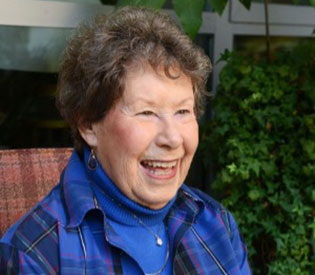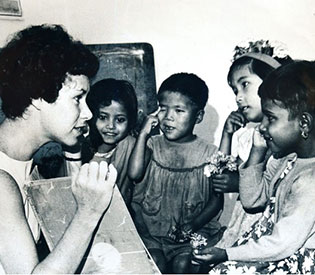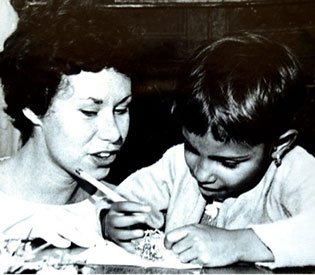Lifetime of Communication, Connections Inspire Gift to Callier
 Kay Aylesworth |
Longtime Dallas resident Kay Aylesworth recently documented a significant planned gift to support the Callier Center for Communication Disorders at The University of Texas at Dallas. The gift—the center’s largest planned gift to date—will help fund care at the Callier Center for children and families who otherwise could not afford it.
In 2021 the Callier Center provided over 20,000 clinical services to more than 3,400 patients, many of whom required significant financial assistance. Aylesworth was moved to support Callier after touring the center and learning about several families whose lives were transformed by their Callier experience.
“My heart is really in this. I just want children and families who can’t afford treatment to be able to hear and talk and to receive communication services,” Aylesworth said. “Callier is considered world class in treatment, education, and research. All you have to do is attend one of their luncheons to see what a difference you can make by supporting the center.”
Throughout her life, Aylesworth found purpose helping people connect with one another. She was formally educated as a music therapist before embarking on a 31-year career as a flight attendant for American Airlines, assisting travelers in their journeys around the globe. In 1967 this career afforded Aylesworth with an opportunity to support Tibetan refugees through the Dr. Thomas A. Dooley Foundation.
In 1965 the Dooley Foundation began recruiting volunteers from the airline industry to staff a child daycare center at a Tibetan refugee camp just outside of Kathmandu, Nepal. Staff at the center stressed hygiene and cleanliness, washing children’s faces and hands, dispensing vitamins and health care to sick children, and securing nutritious food and warm clothing.
The program originally began with recruits from Pan American Airlines and Trans World Airlines but eventually grew to include flight attendants from other airlines. When the Dooley Foundation reached out to employees at American Airlines, Aylesworth requested a leave of absence and became the fourth volunteer from American to travel to Nepal.
 Aylesworth at the Tibetan Refugee Center and Sita Bhawan orphanage in Khatmandu, Nepal. |
Aylesworth spent a combined six months throughout 1967 and 1971 at the Tibetan Refugee Center and Sita Bhawan orphanage in Khatmandu, Nepal. Her work with women and children there fostered an awareness of communication and human connection present in all her life’s work.
When Aylesworth arrived in 1967, conditions at the daycare center had severely deteriorated. An outbreak of paratyphoid had sent previous volunteers home to America, and, in their absence, the center’s residents had abandoned the hygienic practices espoused by the center’s volunteers and medical professionals. Tibetan locals hadn’t yet been fully educated about the purposes of Western medical practices or the mechanisms by which certain drugs and treatments worked and, therefore, discontinued their use when volunteers left.
Aylesworth and other volunteers set about restoring healthy living conditions to the center: disinfecting common areas, creating a sanitary bathroom, and providing medical attention to babies and children. After three months Aylesworth returned home, but she would return to Nepal four years later to work at the same refugee camp.
This time, Aylesworth saw incredible progress in both the camp’s physical infrastructure and the health and well-being of its residents. The camp had been expanded with a safe bricked play area for children, a modern bathroom, a sheltered area for cribs with clean blankets, and a room for group activities.
In 1972 Aylesworth accepted the Splendid American Award in New York City as a representative of the Dooley Foundation airline volunteers. In her speech, she recognized the vital role that communication played in bettering the lives of Tibetan refugees.
“What really made a difference was the connection made between cultures. In the beginning, the importance of daily health rituals—vitamins, washing, etc.—was absent. Gradually over the years, a bond of friendship developed, and an understanding of the value of these practices was solidified,” Aylesworth said. “We worked side-by-side, humans with humans, toward goals vital to successful survival.”
In between her trips to Nepal, Aylesworth returned to school to continue the connective work she had begun during her first stint abroad. She enrolled at Texas Woman’s University to study deaf education,where one of her professors planted the first seed of connection with the Callier Center by frequently mentioning the center in class.
Callier came back into focus for Aylesworth after her retirement from American Airlines, when she began a 20-year career teaching English as a second language at East Dallas Christian Church. One of her students, a mother from Mexico, had a son who received cochlear implants at the Callier Center.
Throughout all these experiences Aylesworth committed herself to advancing human lives through communication and connection, whether they were businesspeople and travelers on her flights, women and children in Nepal, or immigrants to her home city. Extending her support to the Callier Center through her planned gift was a natural extension of her life’s work.
“I guess it has been a pattern in my life, somehow. All of these places—at the Dallas church, in Nepal, and now at Callier—it’s all language, very much language,” Aylesworth said.
 Aylesworth’s work with women and children fostered an awareness of communication and human connection. |
“What really made a difference was the connection made between cultures. We worked side-by-side, humans with humans, toward goals vital to successful survival.” —Kay Aylesworth
According to Dr. Angela Shoup, the Ludwig A. Michael MD Callier Center Executive Director, Aylesworth’s gift will make a substantial difference for future patients.
“Kay Aylesworth is an incredible woman with fascinating life experiences,” Shoup said. “Her commitment to improving the lives of others, especially children with developmental challenges, has been evidenced in many ways—including her work with the children of Nepal. I am deeply grateful to Kay for her inspirational and immensely impactful support of the Callier Center, which will ensure access to life-changing care for so many children with speech, language, and hearing difficulties.”
For Aylesworth, Callier’s achievements go beyond the care it provides to patients. The center’s real work is accomplished by forging connections, hope, and love between individuals.
“I love what’s happening,” Aylesworth said. “I love the love that goes on at Callier and the hope that lives there.”
© Pentera, Inc. Planned giving content. All rights reserved.
Disclaimer